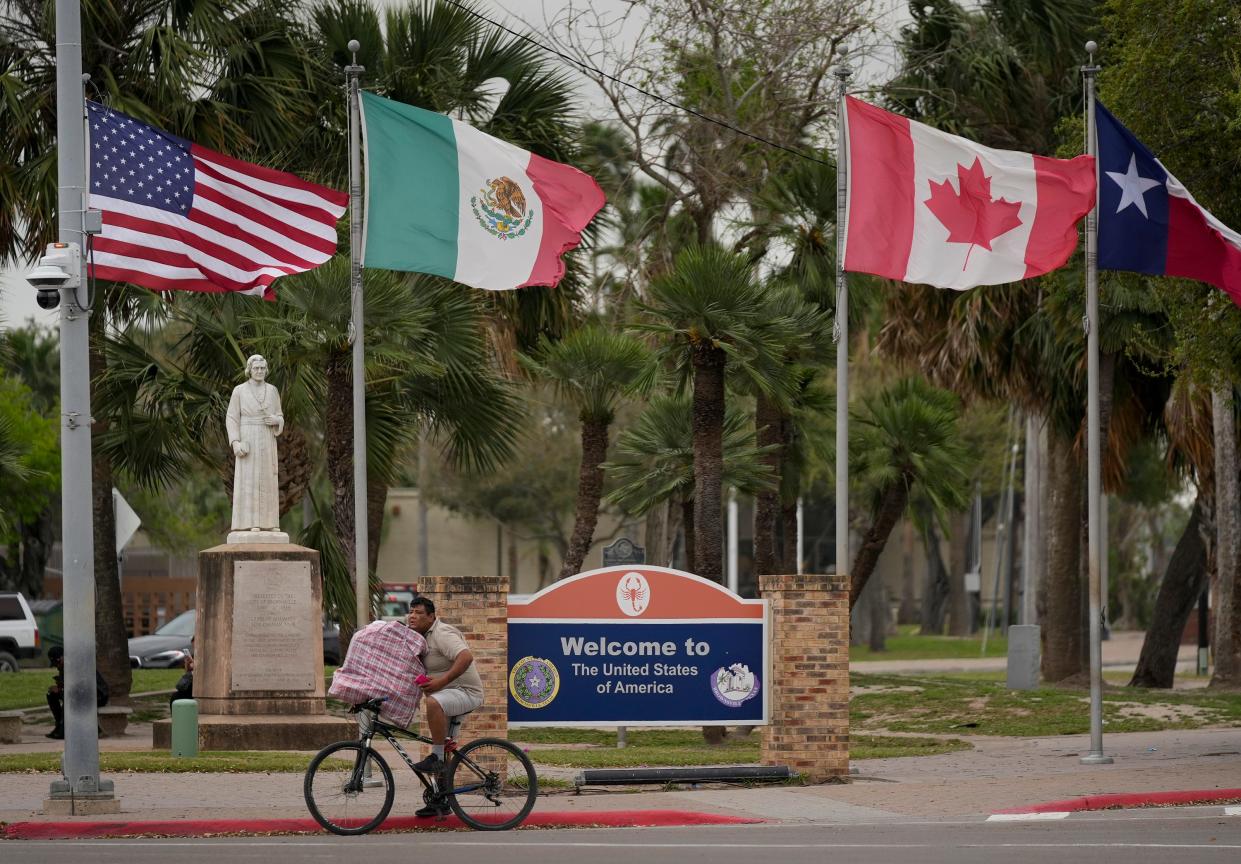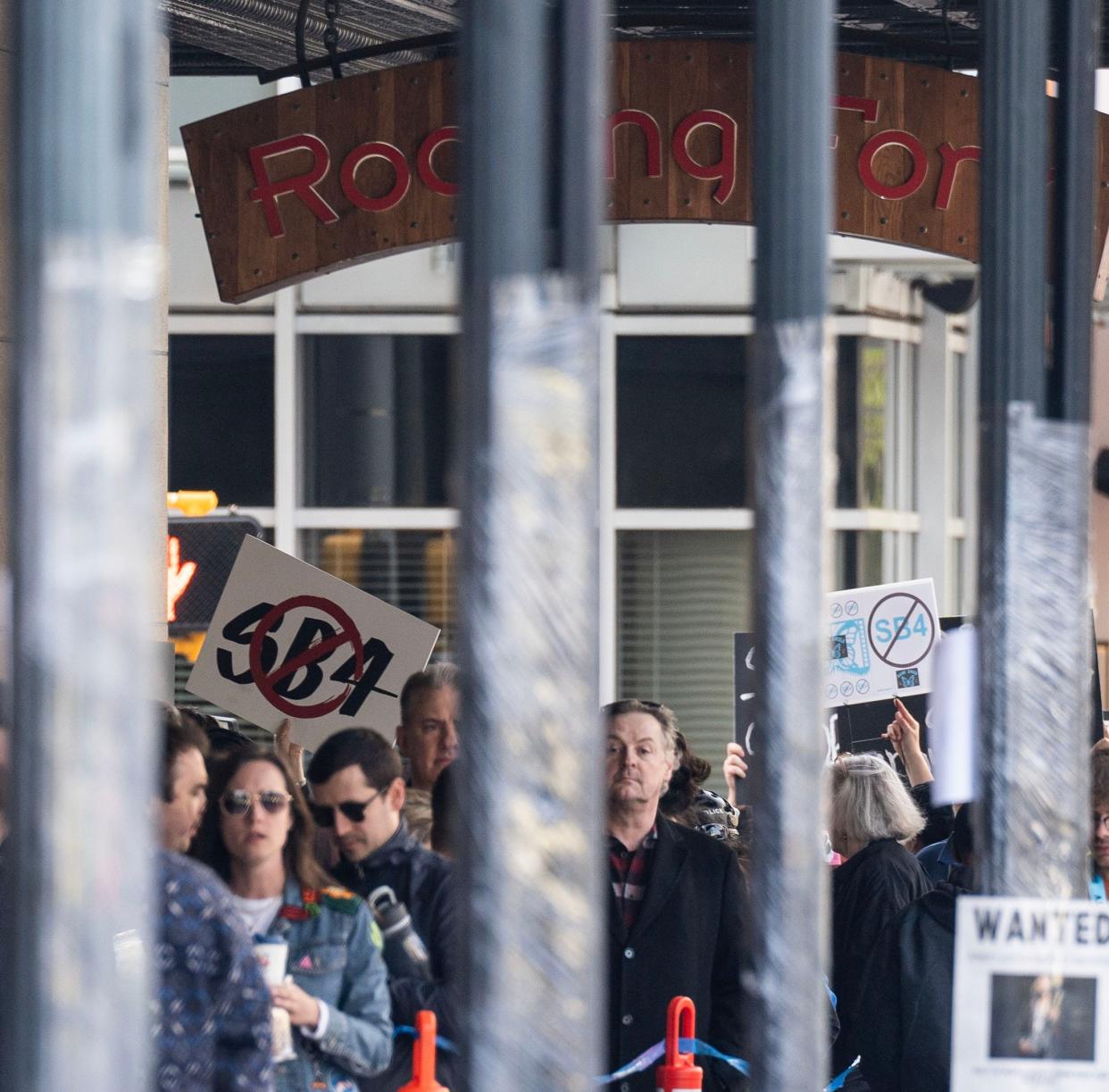5th Circuit Court of Appeals leaves SB 4 on hold after dueling orders on Texas immigration law
After the 5th U.S. Circuit Court of Appeals late Tuesday rescinded its order to allow enforcement of Senate Bill 4 — a Texas immigration law that would authorize state and local law enforcement officials to detain, arrest and even deport people suspected of entering Texas from Mexico without legal authorization — it took no action on the constitutional challenges to the law during a hearing Wednesday, leaving the controversial measure on hold.
The impromptu hearing was announced Tuesday, after dueling court opinions on whether SB 4 should take effect while civil suits challenging the law's standing are settled in court. The U.S. Supreme Court on Tuesday removed a temporarily hold on the law, allowing SB 4 to take effect in Texas for several hours before the New Orleans-based appeals court again stopped the law from being enforced while it considers its constitutionality.

The Legislature in November passed SB 4 to codify a series of penalties for anyone suspected of crossing into the U.S. in Texas other than through an international port of entry. The penalties range from a Class B misdemeanor to a second-degree felony. The law allows state police to arrest migrants suspected of entering the U.S. illegally and to force them to accept a magistrate judge's deportation order or face stiffer criminal penalties for noncompliance.
Federal prosecutors have argued that the law is out of the bounds of state authority and seeks to usurp federal power, which they have continued to make the case for across several court settings dating back to Feb. 29 when Judge David Ezra of the U.S. District Court for the Western District of Texas in Austin issued the law's initial hold.
During Wednesday morning's hearing, which ran just over an hour, a three-judge panel from the appeals court was inquisitive about how Texas would work with federal officials in carrying out any state-driven deportation orders as well as the precedent and administrative concerns raised over allowing the law to take effect while the court hasn't ruled on its constitutionality.

Ultimately, the court did not take any new action Wednesday on SB 4 after its decision to dissolve its previous March 2 stay that had prompted the Supreme Court's intervention.
"SB 4 is a modest, but important statute. It's modest because it mirrors federal law," Texas Solicitor General Aaron Nielson told the judges during Wednesday's hearing. "It's important because it helps to address what even the president has called a border crisis."
Nielson argued four key points in defending SB 4 against a lawsuit challenging the law brought by the U.S. Justice Department and several migrant advocacy groups, including that the immigration organizations lack standing to bring action against the law; Texas is trying to mirror federal law in enshrining SB 4; and that elements of the policy are constitutional and valid as the state has a right to defend itself.
"We've been kind of characterized as Texas is, you know, trying to like take over the field, and that's really not true," Nielson argued. "What Texas wants to do is be able to coordinate with the federal government — Congress is the one that creates the immigration laws, and our laws mirror what Congress has decided."
More: SB 4 again put on hold as 5th Circuit Court schedules Wednesday hearing on how to proceed
Chief Judge Priscilla Richman, an appointee of former President George W. Bush and who is married to Texas Supreme Court Chief Justice Nathan Hecht, was the only judge in the three-member panel to ask questions of Texas' opening argument as the hearing began Wednesday.
Probing how Texas would carry out deportations, Richman asked a series of questions on the relationship the state expects to have with federal officials as migrants are taken to international ports of entry for removal.
"This is the first time, it seems to me, that a state has claimed that they have the right to remove illegal aliens," Richman said.
SB 4, signed into law in December by Gov. Greg Abbott, had been scheduled to take effect March 5, but its implementation was delayed after the Justice Department and civil rights groups sued the state over constitutional challenges.

Nielson, in responding to questions throughout the hearing, was unable to give concrete answers to what the law's removal process would entail, saying he is unsure what would happen when migrants are brought to ports of entry in compliance with a state court's deportation order.
"It depends on what we mean by removal," Nielson responded.
"Again, this is uncharted because we don't have any cases on it," Nielson said later.
Nielson said he also was unsure over whether a migrant who first entered the country in a neighboring border state, and later made their way to Texas, would be subject to SB 4's provisions.
"I confess your honor, I don't know," Nielson said, pointing to the law's intent is to increase coordination with federal agencies on adjudicating immigration issues.
More: Citing ESG policies, Texas Permanent School Fund pulls $8.5B investment from BlackRock
The Justice Department requested that if the appeals court were to allow the law to take effect, that it be granted three business days' notice to potentially file an appeal with the Supreme Court.
Tuesday night, the same appellate court panel in a 2-1 decision rescinded its previous order on SB 4, hours after the Supreme Court by a 6-3 vote paved the way for the controversial state law to take effect for about nine hours.

Richman, along with Judge Irma Carrillo Ramirez, an appointee of President Joe Biden, were in the majority in issuing a pause on the law. Judge Andrew Stephen Oldham, an appointee of former President Donald Trump, dissented.
During the time SB 4 was in effect, from about 1-10 p.m., both English- and Spanish-language searches of “SB4” spiked dramatically, according to Google Trends.
Initially, Ezra, the federal district judge in Texas, issued a hold on SB 4 in February out of a bevy of constitutional concerns — an order which the 5th Circuit overturned March 1, allowing the law to take effect shortly thereafter unless the Supreme Court intervened.
On March 4, Supreme Court Justice Samuel Alito took interest in the case and issued a hold on the law while the high court considered whether to keep SB 4 at bay while the federal appeals court considered the law's constitutional merits.
Alito's hold lasted until Tuesday afternoon, when the Supreme Court removed its hold and let SB 4 take effect, leading to the appeals court's late-night order to again pause the law and hold Wednesday morning's hearing.
The Supreme Court's order Tuesday was cause for brief celebration by Texas Republicans, including Gov. Greg Abbott, Lt. Gov. Dan Patrick and Attorney General Ken Paxton, who have pushed for the law and have defended it since it was passed in a special session in November.
Abbott, who expressed cautious optimism after the Supreme Court order to remove the hold Tuesday afternoon, said Wednesday that arrests on the border will be made regardless of the court's order.
"But notice what they (the 5th Circuit judges) have stayed is the Texas enforcement of SB 4," Abbott said during remarks at the conservative Texas Public Policy Foundation summit Wednesday in Austin. "But even without SB 4, Texas has the legal authority to arrest people coming across the razor wire barriers on our border — and we will continue to use our arrest authority."
Statesman staff writers Bayliss Wagner and John Moritz contributed to this report.
This article originally appeared on Austin American-Statesman: 5th Circuit Court of Appeals considers SB 4, leaves Texas law on hold
